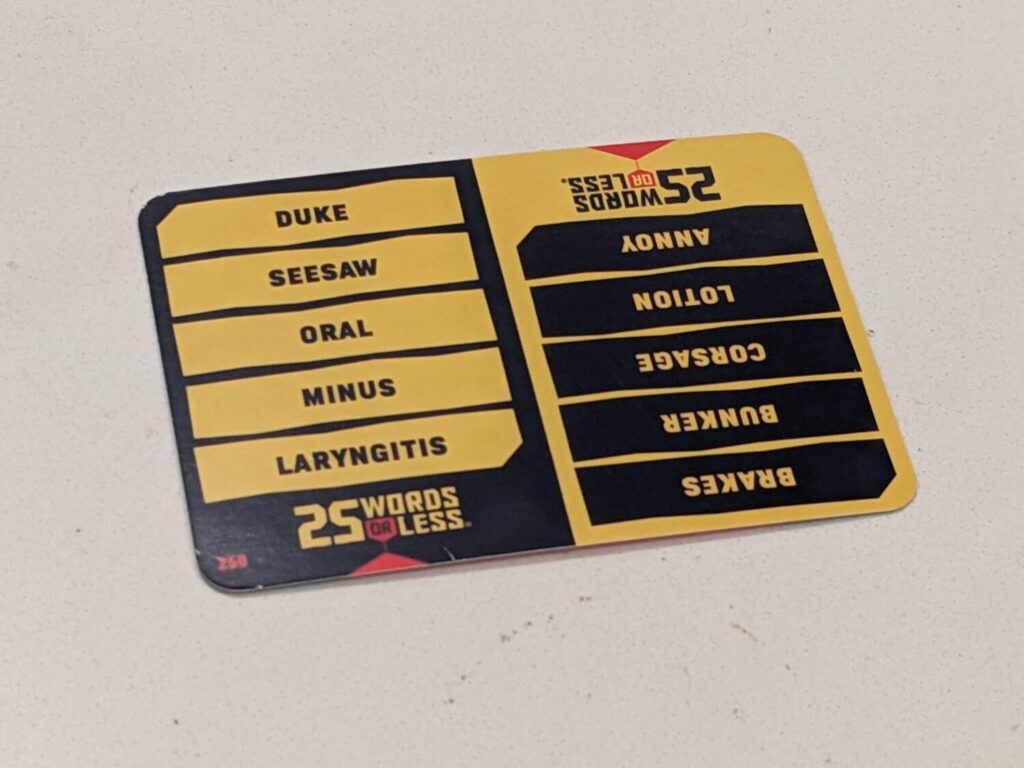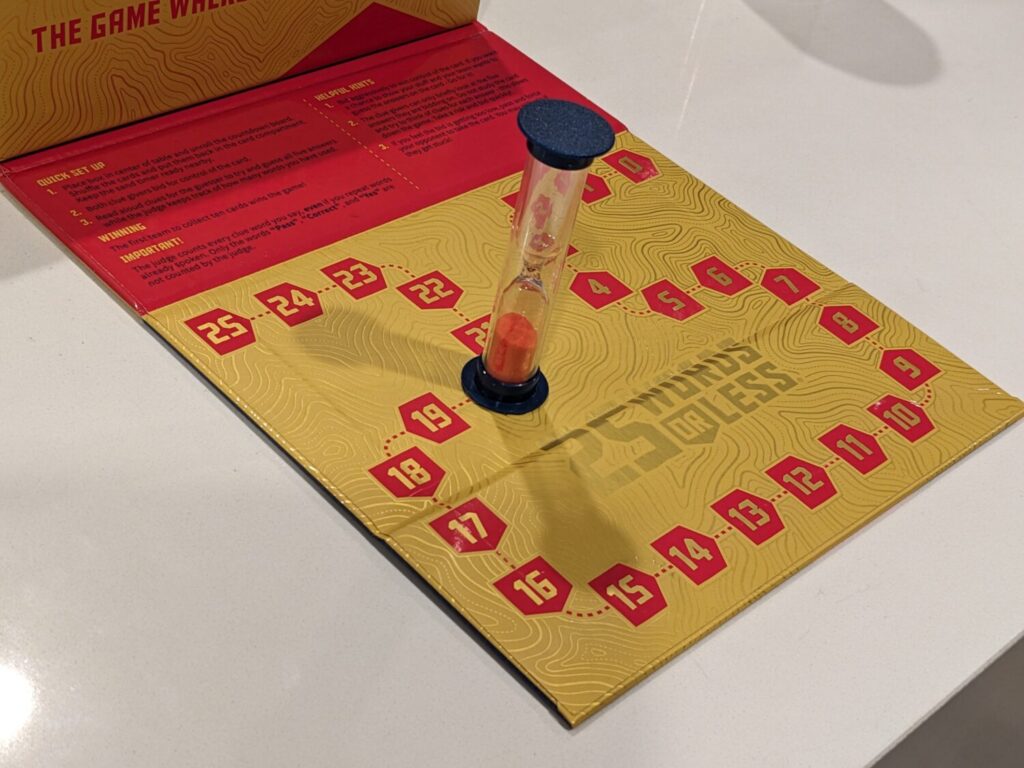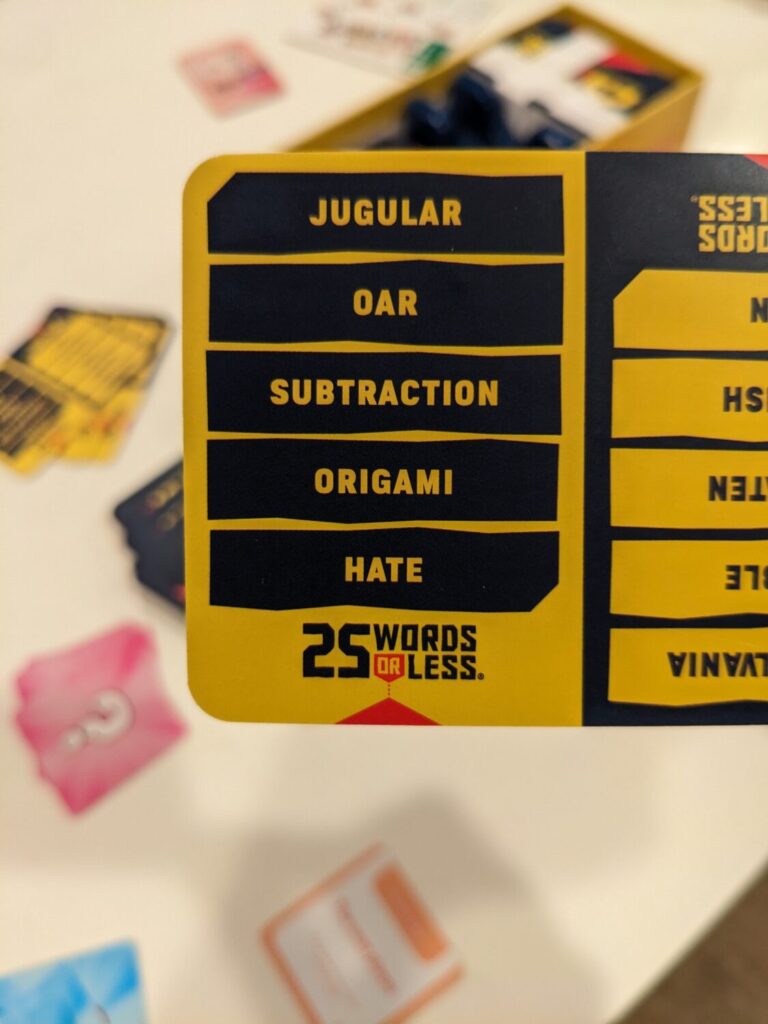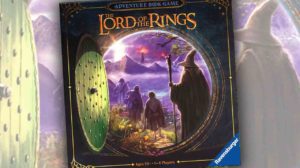Disclosure: Meeple Mountain received a free copy of this product in exchange for an honest, unbiased review. This review is not intended to be an endorsement.
My typical choice for kicking off a party game night at my house is a word association game. That usually comes in the form of either Just One, Caution Signs, Wavelength, Codenames, or Decrypto. At this stage of my time in “The Hobby”, I don’t need any other games in that portion of my catalog because I think that fivesome is bulletproof and has worked with every kind of player, distant relative, and household pet in my network.
Still…I’m always hunting for The Next Big Thing. 25 Words or Less (2025, The Op) is not cracking that extended Mount Rushmore of word games. But it is a lot of fun, particularly with smart players who want to efficiently wordsmith clues in the hopes of getting their team to guess the answers on a card within 60 seconds.

“Go For The [blank]”
25 Words or Less is a word association game for groups of four or more players. Once split into teams, one player from each team looks at a single clue card simultaneously and studies it for about 15 seconds, then begins to bid in a funny way: a player suggests a number of words that they can give as clues to their team in order to make them correctly guess all five words on the card.
The other player bids them down. “I can do this in 22 words,” says the first player. “I can do it in 19,” says the opposing bidder. “Make it 17.” This goes on until one player has picked a number that the other player thinks will be too low, then the “winner” of the card has to then get their team to guess all five words in less than 60 seconds.
The loser of the bid then becomes both the round timer–using the sand timer to count down the words used by the lead player–and the judge, to ensure the lead player stays on track and uses legal phrasing to provide hints for their team. Oh, and the word tracker is slick: the fold-out box cover conveniently doubles as a simple way to let all players know how many words a team has left in a round.
Here was a recent sample from a game of 25 Words of Less (bid of 15 words):
- Terminator: Schwarzenegger, movie
- Hot: not cold, but… (leading is allowed as a clue type)
- Mahjong: Chinese game, tiles
- Hula hoop: Hawaiian, hips, swing, twist
- Dress: skirt
In this example, the winning team got their team to guess all five of those words in 13 clue words.

25 Words or Less brings out an interesting tic in the human speech pattern: it’s hard to get through an exercise like this without saying a bunch of filler words: “um”, “so”, “you know”, “it’s like.” But all of those words count against the person giving the clues, and the judge is responsible for tracking those words when they are measuring the lead player.
That led to a lot of interesting moments, as I watched players carefully—sometimes, very carefully—measure their words. It also counts against a player to say something like “so, like the one you guys got earlier…” That’s eight more words! For the “Chatty Cathy” in us all, that meant being really efficient to knock out turns in under 15 words, especially if you do something crazy like attempting to do this in under 10 clue words.
The variety of clues is somewhat obscene…there are 300 clue cards, split into halves of five words each, meaning there are three THOUSAND words included in the box. In a normal game, the max number of cards two teams might use are 19, because once one team reaches 10 cards (earned by getting all five clues themselves, or by stealing a card if the other team fails to get all five clues), the game is over.
There are so many cards that I haven’t even opened the packaging for the 150 cards on one side of the included storage. And with so many different words and so many ways to describe each one, I am having a hard time imagining a scenario where I go through them all.

A Good Time
25 Words or Less was fun. I showed it to eleven other unique individuals, and eight of them loved it. The three that didn’t had some of the same concerns that I had—namely, that the most exciting role to play in this game is that of the clue giver. Losing a bid when playing in teams of 10 might mean that you never get the chance to be the clue giver…and that is a miss.
Also, I have found teams more likely to lose their turns than win them. This happened regularly in my play with gamers who really wanted to push the efficiency by bidding less than 10 words on their turns. There have been some exceptions to this, but usually, when a player dives below 15 words, their chances of winning really shrink. It’s hard to come up with two-word clues for some of the words on each card (what’s your one-word clue for “locate”?), and players don’t get long to study the card before launching into their timed attack.
That led savvy players to begin bidding their opponents down then taking the Family Feud route. In the game show, the move late in the game (by the time the game moves to Double or Triple Score) is to win the initial survey question, then pass to the other team, because it is so hard to get the final answer in a survey with only three or four responses.
25 Words or Less also requires one team to gain 10 answer cards to win; we found that five is a much more reasonable idea, in terms of timing and player engagement. So I recommend house-ruling the win condition based on your playgroup. Don’t like competitive play? You could absolutely just play this casually with your family, with one person being the clue giver and all other players trying to guess the words within a minute.
25 Words or Less was a lot of fun and does just enough different things to justify its existence in the collection. I played it only with adults, but for gamers who have children with a fairly rich vocabulary, I could see 25 Words or Less working with kids as well.











